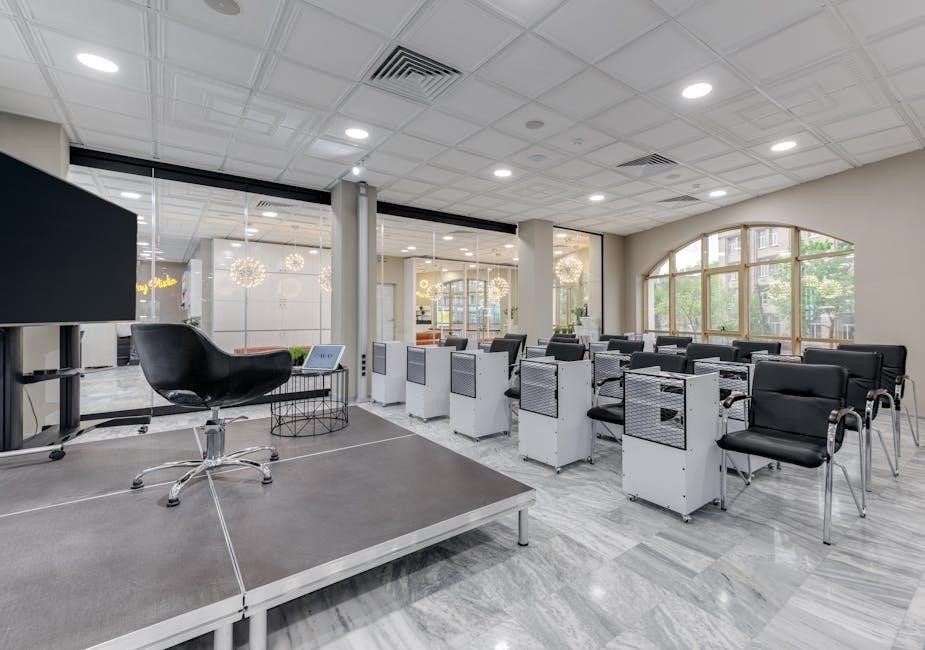Creating an event venue business plan is essential for success. It outlines market analysis, marketing strategies, operations, and financial projections, ensuring profitability and organized event management. A well-structured PDF template simplifies the planning process, providing a clear roadmap for launching and growing your event venue business effectively.

Market Analysis for Event Venues
Market analysis is crucial for identifying target markets and analyzing competitors. It helps determine viability, ensuring your venue meets demand and stands out in the industry.
Identifying Target Market

Identifying your target market is the cornerstone of a successful event venue business. It involves understanding the demographics, preferences, and needs of potential clients. For instance, couples planning weddings, corporate entities seeking conference spaces, or individuals organizing social gatherings each represent distinct market segments. Analyzing these groups helps tailor your venue’s offerings to meet their specific requirements. By focusing on these target markets, you can create specialized packages and services that cater to their needs, ensuring your venue stands out and attracts consistent bookings. This targeted approach is essential for maximizing occupancy and revenue in a competitive industry.
Competitor Analysis
Conducting a thorough competitor analysis is crucial for understanding the event venue market landscape. Identify existing venues in your area, assess their strengths and weaknesses, and evaluate their pricing, services, and clientele. Analyze their marketing strategies, customer reviews, and event calendars to uncover gaps in the market. This analysis helps you differentiate your venue by offering unique amenities, competitive pricing, or specialized services. By understanding your competitors, you can position your venue to attract a specific audience and establish a strong foothold in the industry. This insight is vital for crafting a compelling business plan that sets your venue apart from others.

Marketing and Sales Strategy
A strong marketing and sales strategy is vital for attracting clients. Focus on branding, promotions, and pricing to create a compelling offer that drives bookings and ensures long-term success.
Branding and Promotion
Effective branding and promotion are crucial for attracting clients to your event venue. Develop a strong brand identity that reflects your venue’s unique atmosphere and services. Utilize digital marketing tools, such as websites and social media platforms, to showcase your space and engage potential customers. Implement search engine optimization (SEO) to improve visibility in local searches. Leverage email marketing campaigns to stay in touch with past clients and promote upcoming events. Consider offering referral incentives and discounted rates for repeat bookings to build loyalty. Partner with local businesses and event planners to expand your reach and create a robust promotional network.
Pricing Strategy
Your pricing strategy should balance profitability with affordability, ensuring it reflects the value your event venue offers. Consider factors like location, amenities, and peak seasons when setting rates. Research competitors to position your pricing competitively while highlighting unique features. Offer tiered pricing models to cater to different budgets, such as basic, premium, and luxury packages. Provide discounts for off-peak bookings or long-term commitments to attract consistent business. Clearly communicate pricing structures in your business plan to avoid confusion. Regularly review and adjust your pricing strategy based on market trends and client feedback to maintain profitability and attract a diverse clientele.

Venue Operations Plan
A venue operations plan ensures smooth event execution and client satisfaction. It includes key logistics, vendor coordination, and risk mitigation strategies.
Location and Facilities
The location of your event venue is critical to its success. It should be easily accessible, with proximity to transportation and ample parking. The facilities must be well-maintained, offering a clean, safe, and comfortable environment for guests. Key amenities such as restrooms, lighting, and electrical infrastructure are essential. Additionally, the venue should be adaptable to various event types, with flexible layouts and necessary equipment. Safety and accessibility compliance are also vital. A prime location paired with top-tier facilities will enhance your venue’s appeal and ensure a positive experience for clients and attendees alike, setting your business up for long-term success.
Staffing and Management
Effective staffing and management are crucial for the smooth operation of an event venue. Hiring a team with diverse skills, including event coordination, customer service, and technical support, ensures all aspects of events are managed efficiently. Clear roles and responsibilities should be defined, with experienced managers overseeing daily operations and event execution. Training staff on venue policies, safety protocols, and emergency procedures is essential. Strong leadership fosters a positive work environment and ensures high standards of service delivery. A well-organized management structure supports scalability and adaptability, enabling the venue to handle various event sizes and types while maintaining professionalism and client satisfaction consistently.

Financial Plan and Projections
A comprehensive financial plan is vital for the sustainability of an event venue business. It outlines projected revenue streams, including venue rentals, catering services, and additional amenities. Expenses such as facility maintenance, utilities, staffing, and marketing should be detailed. Financial projections, typically covering a 3-5 year period, provide insights into expected income and expenditure trends. The plan should also address funding requirements, such as startup costs and potential loan or investment needs. Regular financial reviews and contingency plans for unforeseen expenses are essential to ensure profitability and adaptability. Accurate projections help stakeholders understand the venue’s financial health and growth potential.

Risk Management and Contingency Planning
Risk management is crucial for ensuring the longevity and success of an event venue business. Potential risks include low booking rates, operational disruptions, and unexpected expenses. A contingency plan should outline strategies to mitigate these risks, such as diversifying revenue streams or having backup vendors. Regular monitoring and adaptation of risk management strategies are essential to address evolving challenges. Additionally, maintaining adequate insurance coverage and emergency funds can safeguard the business during unforeseen events. By proactively addressing potential risks, the venue can minimize disruptions and ensure smooth operations, ultimately protecting its reputation and financial stability in the competitive event industry.

Legal and Regulatory Requirements
Compliance with legal and regulatory requirements is vital for operating an event venue. Ensure you obtain necessary licenses and permits, such as business licenses, liquor licenses, and health department certifications. Zoning laws must be adhered to, and fire safety codes should be strictly followed. Liability insurance is essential to protect against potential risks. Additionally, contracts with vendors and clients must be legally binding and clear. Familiarize yourself with local noise ordinances and accessibility standards. Failure to comply can result in fines or legal action. Regularly review and update your understanding of regulations to maintain operational integrity and avoid legal complications. Compliance ensures smooth and lawful business operations.

Case Studies and Success Stories
Examining successful event venues provides valuable insights. A prominent wedding venue doubled its bookings by offering customized packages and leveraging social media. Another urban space increased profitability by hosting corporate events and workshops. These case studies highlight the importance of understanding target markets, adaptive branding, and flexible facilities. Success often stems from innovative marketing, excellent customer service, and strategic partnerships. Analyzing these examples can help identify key strategies to replicate in your own business. Learning from others’ achievements and challenges accelerates growth and enhances decision-making. These stories demonstrate how a well-executed business plan can transform an event venue into a thriving, profitable enterprise.

Downloading and Using Event Venue Business Plan Templates
Free event venue business plan PDF templates are available online, offering customizable outlines for market analysis, marketing, and financial projections. These templates simplify the planning process and ensure a professional approach to launching your venue, providing a clear framework to guide your business strategy and goals effectively.
Free PDF Templates
Free event venue business plan PDF templates are readily available online, offering a cost-effective solution for entrepreneurs. These templates provide pre-designed sections for market analysis, marketing strategies, financial projections, and operational plans. They are customizable to suit specific business needs, ensuring a professional and structured approach. By downloading these templates, users can save time and focus on developing a comprehensive plan. Many templates include examples and guidelines, making it easier for newcomers to understand and implement effective strategies. Utilizing a free PDF template is a practical way to streamline the planning process and ensure all critical aspects of the business are addressed.
Customizing the Template
Customizing an event venue business plan PDF template allows you to tailor it to your specific business needs. Start by replacing generic information with your venue’s details, such as location, target market, and unique offerings. Adjust sections like market analysis, pricing strategies, and operational plans to reflect your goals. Use the template’s structure to ensure clarity and coherence while making it uniquely yours. Many templates are editable, enabling you to add branding elements like logos and color schemes. This personalization helps create a professional and polished document that stands out to investors or partners. Tailoring the template ensures your plan is both comprehensive and authentic, aligning perfectly with your vision and objectives.
Developing a comprehensive event venue business plan is crucial for success in this competitive industry. Utilizing a downloadable PDF template provides a structured approach, ensuring all critical aspects are addressed. From market analysis to financial projections, a well-crafted plan guides decision-making and secures investments. Customizing the template to reflect your venue’s unique goals and offerings ensures authenticity and professionalism. By following the outlined strategies and maintaining flexibility, you can establish a thriving event venue business. A thorough plan not only sets the foundation for profitability but also positions your venue as a preferred destination for various events, fostering long-term growth and sustainability.